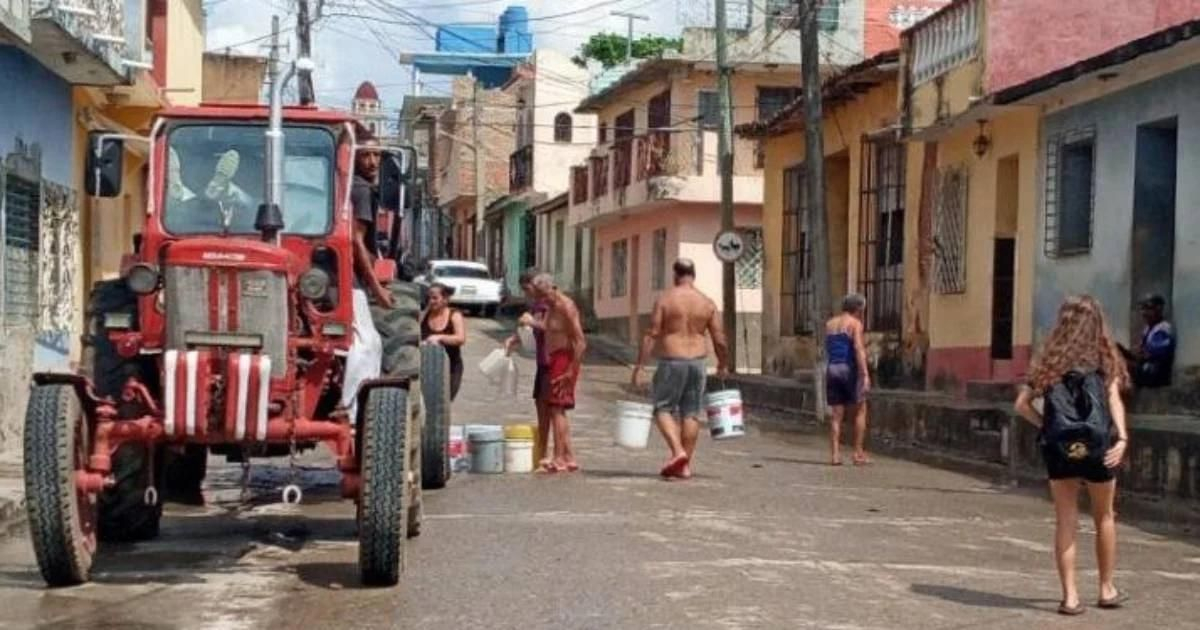Approximately 700,000 people in Cuba do not receive water on a daily basis due to blackouts, as the water sector is the second-largest consumer of electricity after residential demand, according to official sources.
Antonio Rodríguez Rodríguez, president of the National Institute of Hydraulic Resources (INRH), described the current potable water distribution as "a very complex situation," pointing to continuous power outages, which he referred to as a "energy contingency," as the main cause, reported the state-run newspaper Granma.
Although the number of people lacking daily water service due to blackouts is alarming, only half of the Cuban population receives water consistently, while the rest face shortages due to various reasons, such as drought, lack of distribution networks, breakdowns, and corruption, among others.
Rodríguez depicted the bleak scenario faced by power generators in supply plants, noting that recently there was only coverage for 36% of supply sources in the territories: “we have reached 57%, but we hope to cover 65% with the incoming batteries soon,” he stated without specifying a date.
The official admitted that the problem worsens because companies responsible for the maintenance and repair of generators lack spare parts, complicating the operation of the equipment. Additionally, fuel supply to the generators also encounters difficulties. The INRH president explained that "some of these units are located in hard-to-reach areas and do not always receive diesel on time."
As a stopgap, water is transported in tanker trucks, "which lengthens the cycles in those communities that do not receive water through the pipes," highlighting the challenging situation faced by the affected population.
As a potential solution, Rodríguez noted that the installation of 722 solar-powered units is currently underway to reduce dependence on the national electricity grid. He mentioned that more than 600 units are already in service, with another 144 units recently deployed to mountainous municipalities: "I am talking about 170 pumping stations that will install 70 solar-powered units in the eastern part of the country. Another 74 will be allocated to Villa Clara."
Finally, the official boasted that by next July, they aim to have “866 units operational, representing 866 locations where water supply will not be affected by power cuts.”
On the most recent Monday, the state-run newspaper Escambray reported that photovoltaic systems are being installed in 10 potable water pumping stations in the municipality of Yaguajay, located in the province of Sancti Spiritus. Yusniel Benavides Triana, director of the UEB Aqueduct and Sewerage in that municipality, pointed out that "almost all the pumps in the territory are hybrid, operating with both solar and electrical energy."
He explained that "from the energy produced by the panels, they use a percentage and feed the rest into the National Electric System," resulting in an 80% reduction in consumption. Despite the benefits of this technology, the director mentioned that there are still eight pumping stations out of the 18 planned installations that lack photovoltaic systems.
Additionally, he emphasized that the stations in San José, Iguará, La Dalia, Perea, Siboney, and Frente Norte de Las Villas in Mayajigua already have solar panels, but are not yet operational "due to the lack of photovoltaic cables." In other words, there are still five pumping plants that, although they could generate significant energy savings, remain exclusively connected to the National Electric System due to poor management in obtaining photovoltaic cables.
Impact of Water Shortages and Blackouts in Cuba
The following questions provide insight into the issues surrounding water shortages and blackouts in Cuba, based on the article's information.
Why are 700,000 Cubans without daily water supply?
Approximately 700,000 Cubans are without daily water supply due to blackouts, as the water sector is a significant consumer of electricity, second only to residential demand.
What is being done to mitigate the water supply issue?
To mitigate the issue, 722 solar-powered units are being installed to reduce dependency on the national electricity grid. More than 600 units are already in service, with additional units deployed to various municipalities.
What challenges do the power generators face?
Power generators face challenges such as a lack of spare parts for maintenance and repair, as well as difficulties in fuel supply, particularly diesel, which is hard to deliver to remote locations.
